Cbmt stuvia - Study guides, Class notes & Summaries
Looking for the best study guides, study notes and summaries about Cbmt stuvia? On this page you'll find 80 study documents about Cbmt stuvia.
Page 4 out of 80 results
Sort by
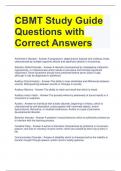
-
CBMT Study Guide Questions with Correct Answers
- Exam (elaborations) • 24 pages • 2024
- Available in package deal
-
- $11.96
- + learn more
stuvia,usa,uk,2024,latest,real,verified,correct,student oriented ,study,exam, CBMT Study Guide Questions with Correct Answers
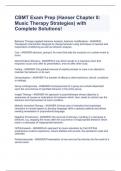
-
CBMT Exam Prep (Hanser Chapter 8: Music Therapy Strategies) with Complete Solutions!
- Exam (elaborations) • 2 pages • 2024
- Available in package deal
-
- $11.99
- + learn more
CBMT Exam Prep (Hanser Chapter 8: Music Therapy Strategies) with Complete Solutions!CBMT Exam Prep (Hanser Chapter 8: Music Therapy Strategies) with Complete Solutions!CBMT Exam Prep (Hanser Chapter 8: Music Therapy Strategies) with Complete Solutions!CBMT Exam Prep (Hanser Chapter 8: Music Therapy Strategies) with Complete Solutions!CBMT Exam Prep (Hanser Chapter 8: Music Therapy Strategies) with Complete Solutions!CBMT Exam Prep (Hanser Chapter 8: Music Therapy Strategies) with Complete Soluti...
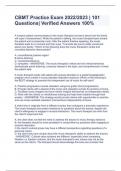
-
CBMT Practice Exam 2022/2023 | 101 Questions| Verified Answers 100
- Exam (elaborations) • 27 pages • 2023
-
- $11.99
- + learn more
A hospice patient communicates to the music therapist concerns about how the family will cope in bereavement. While the patient is talking, the music therapist leans toward the patient and occasionally nods. After the patient finishes speaking, the music therapist waits for a moment and then says, "It sounds like you're really concerned about your family." Which of the following does the music therapist's verbal and nonverbal behavior demonstrate? A. unconditional positive regard B.acti...
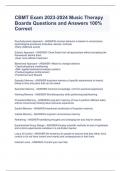
-
CBMT Exam 2023-2024 Music Therapy Boards Questions and Answers 100% Correct
- Exam (elaborations) • 13 pages • 2023
-
- $11.49
- + learn more
Psychodynamic Approach - ANSWER--Human behavior is based on unconscious psychological processes (impulses, desires, motives) -Early childhood events Eclectic Approach - ANSWER--Draw freely from all approaches without accepting the frameworks behind them -Goal: more efficient treatment Behavioral Approach - ANSWER--Meant to change behavior -Classical/operant conditioning -ABA: applied behavioral analysis (autism) -Positive/negative reinforcement -Punishment and Reward Episodic Memo...
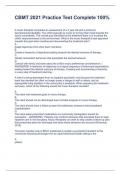
-
CBMT 2021 Practice Test Complete 100%
- Exam (elaborations) • 20 pages • 2023
-
- $10.99
- + learn more
A music therapist completes an assessment of a 3 year old with a profound developmental disability. The child responds to music by turning their head towards the sound consistently. The overall goal identified by the treatment team is to increase the child's responsiveness to the environment. What is the music therapist's best approach towards this goal when creating and documenting the treatment plan? A. Adapt objectives from other team members. B. Create a hierarchy of objectives leading...
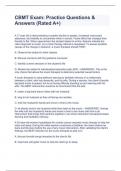
-
CBMT Exam: Practice Questions & Answers (Rated A+)
- Exam (elaborations) • 23 pages • 2023
-
- $11.99
- + learn more
A 17 year old is demonstrating a sudden decline in grades, increased unexcused absences, and inability to concentrate when in school. Facial affect has changed from friendly to flat. When approached, the student states he is fine. Reports indicate the client responds to music, so a music therapy referral is requested. To assess possible causes of the change in behavior, a music therapist should FIRST A. Observe the student in other classes B. Discuss concerns with the guidance counselor ...
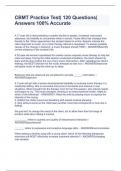
-
CBMT Practice Test| 120 Questions| Answers 100% Accurate
- Exam (elaborations) • 12 pages • 2023
-
- $10.99
- + learn more
A 17 year old is demonstrating a sudden decline in grades, increased unexcused absences, and inability to concentrate when in school. Facial affect has changed from friendly to flat. When approached, the student states he is fine. Reports indicate the client responds to music, so a music therapy referral is requested. To assess possible causes of the change in behavior, a music therapist should FIRST - ANSWERSidentify current stressors in the student's life. A 52-year-old woman hospitalized ...
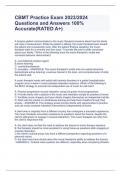
-
CBMT Practice Exam 2023/2024 Questions and Answers 100% Accurate(RATED A+)
- Exam (elaborations) • 27 pages • 2023
-
Available in package deal
-
- $11.99
- + learn more
A hospice patient communicates to the music therapist concerns about how the family will cope in bereavement. While the patient is talking, the music therapist leans toward the patient and occasionally nods. After the patient finishes speaking, the music therapist waits for a moment and then says, "It sounds like you're really concerned about your family." Which of the following does the music therapist's verbal and nonverbal behavior demonstrate? A. unconditional positive regard B.acti...
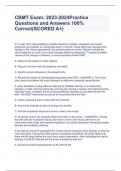
-
CBMT Exam: 2023-2024Practice Questions and Answers 100% Correct(SCORED A+)
- Exam (elaborations) • 23 pages • 2023
-
Available in package deal
-
- $11.49
- + learn more
A 17 year old is demonstrating a sudden decline in grades, increased unexcused absences, and inability to concentrate when in school. Facial affect has changed from friendly to flat. When approached, the student states he is fine. Reports indicate the client responds to music, so a music therapy referral is requested. To assess possible causes of the change in behavior, a music therapist should FIRST A. Observe the student in other classes B. Discuss concerns with the guidance counselor ...
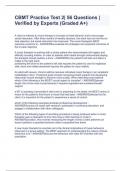
-
CBMT Practice Test 2| 56 Questions | Verified by Experts (Graded A+)
- Exam (elaborations) • 7 pages • 2023
-
- $10.49
- + learn more
A client is referred to music therapy to increase on-task behavior and to encourage social interaction. After three months of weekly sessions, the client has not met the on-task objective, but social interaction has improved. The music therapist's BEST response would be to - ANSWERSre-evaluate the strategies and expected outcomes of the on-task objective A music therapist is working with a stroke patient who demonstrates left neglect and difficulty crossing midline. In order to address both ...

How did he do that? By selling his study resources on Stuvia. Try it yourself! Discover all about earning on Stuvia


